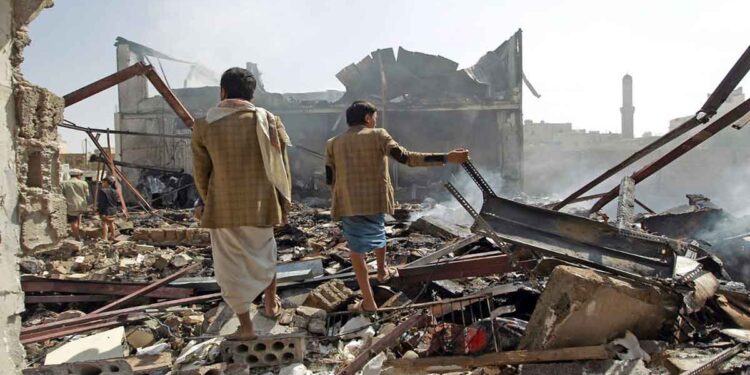At least 38 civilians have been killed and over 100 injured on Thursday evening following a devastating US airstrike on the Ras Issa oil port in Yemen’s western al-Hudaydah governorate, according to local reports.
The victims reportedly included port workers, medics, and nearby civilians. Harrowing footage aired by local media showed charred remains and dismembered bodies strewn across the site, which is considered a vital lifeline for importing essential petroleum derivatives used across Yemen.
Medical sources have confirmed that many of the wounded are in critical condition, amid a severe shortage of medical supplies and resources due to the ongoing blockade imposed on the country.
This strike is part of a broader US aerial campaign that has been ongoing for over a month. Previous raids have targeted the provinces of al-Bayda and Sanaa, causing significant civilian casualties and damage to non-military infrastructure.
The escalation comes amid rising regional tensions linked to the conflict in Gaza, which reignited in October 2023. Yemeni forces have claimed responsibility for attacks on vessels linked to the US and Israel, in what they describe as retaliation for the siege and renewed bombardment of Gaza following the collapse of a temporary truce in mid-March.
The growing intensity of US strikes in Yemen is worsening an already dire humanitarian crisis. Millions face deteriorating living conditions, a collapsing healthcare system, and crumbling infrastructure.
Humanitarian organisations are struggling to deliver aid to affected areas, while concerns are mounting that repeated attacks on civilian facilities may amount to a deliberate policy, compounding what rights groups have called one of the gravest humanitarian and human rights catastrophes globally.
Legal experts have raised serious concerns regarding the legality of the strike on Ras Issa under international humanitarian law. The attack on a civilian port, used primarily to receive fuel vital for hospitals, water and power systems, and which supports the livelihoods of hundreds, may constitute a violation of the Geneva Conventions. These treaties mandate all parties in armed conflict to distinguish between military and civilian targets and to take all feasible precautions to protect civilian lives.
The high civilian death toll, particularly among aid workers and non-combatants, has further raised questions about whether the principle of proportionality was respected. International law prohibits attacks in which expected civilian harm is excessive in relation to the anticipated military advantage.
Under international law, the aggressor state is held accountable for civilian harm and is obliged to provide reparations. Article 85 of the Additional Protocol I to the Geneva Conventions defines deliberate or indiscriminate attacks on civilians as war crimes, warranting urgent international investigation and prosecution of those responsible.
The attack on Ras Issa cannot be viewed in isolation from the broader humanitarian catastrophe unfolding in Yemen; a country already grappling with one of the world’s worst crises. This incident requires immediate action by the international community, including the United Nations and the Human Rights Council, to prevent further violations and ensure civilian protection in accordance with international law.


























